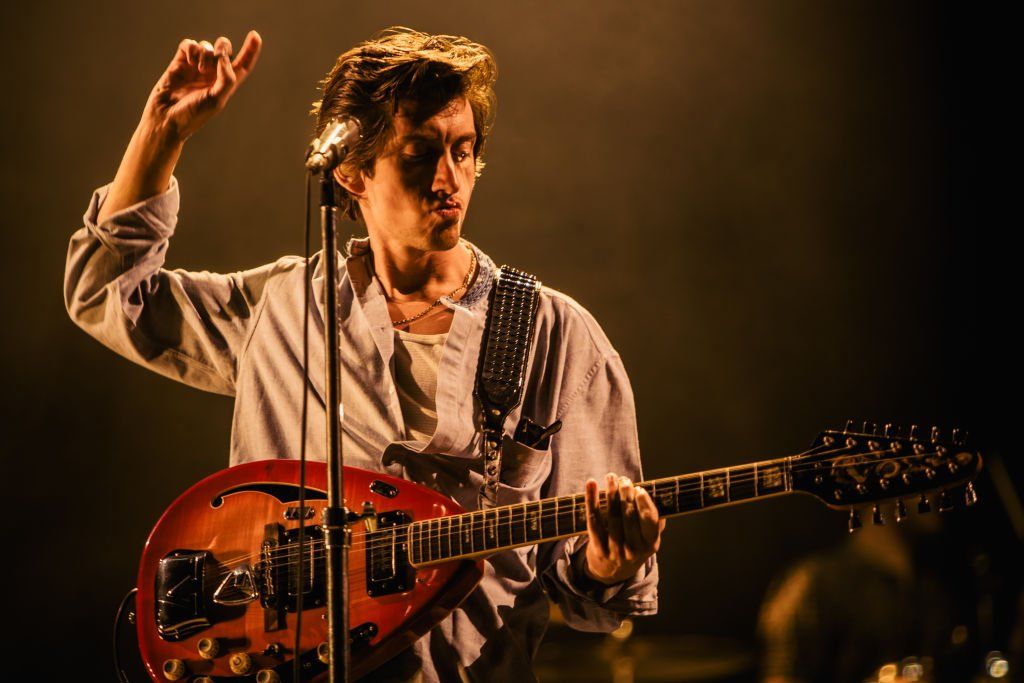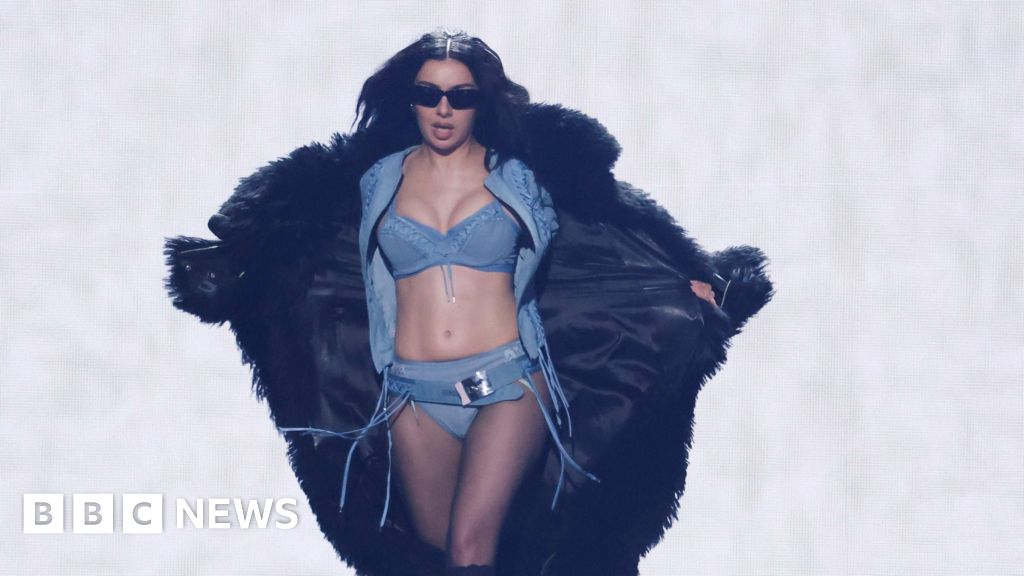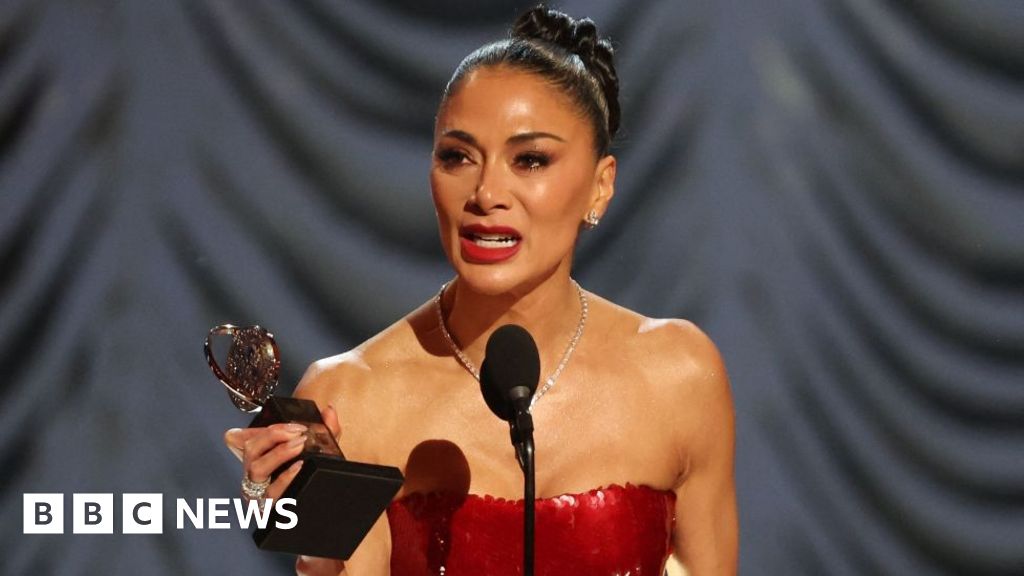ARTICLE AD BOX
 Image source, Getty Images
Image source, Getty Images
Alex Turner formed Arctic Monkeys in 2002 with friends he'd known since primary school
By Mark Savage
BBC Music Correspondent
Alex Turner is out of breath.
The Arctic Monkeys frontman has just blazed through a guitar solo on Body Paint - the swaggering, Bowie-esque centrepiece of their new album, The Car - on TV institution Later with Jools Holland.
"You've parched me out there," he pants. "Could someone get me a water?"
Unusually, the Arctics are the only band in the studio. For the first time in 15 years, the show is devoting an entire episode to a single act - an honour reserved for rock legends like REM, Radiohead, Metallica and Oasis.
Turner and his band-mates appreciate the enormity of the situation. They film additional takes and switch up their setlist to ensure the new music is conveyed with appropriate punch and panache.
"Gotta make this one count," says Turner as the recording runs into its second hour. "We'll do an acoustic one, and then Born To Run."
The promised Springsteen cover never materialises. Nor does the band's hellraising 2007 hit Brianstorm, despite guitarist Jamie Cook idly bashing out the riff between takes. But, with almost twice as much Monkey business as they'd bargained for, the audience leaves on a high.
Warning: Third party content may contain adverts
"I enjoyed it a great deal," agrees Turner, on the phone to the BBC a couple of days later. "I'm a big fan of that show and I have been for a long time, even before we put the band together."
In fact, his highlight in the run-up to the show was getting access to the Later vaults, to pick a performance that influenced him for broadcast on the show.
"I kind of lost myself in the archive back there for a minute, Mark, to be honest with you," he says. "I found myself gravitating to performances from 2002 and going, 'Oh God, yeah, I remember seeing that and getting excited about it.'"
Strong relationships
Of course, 2002 is the year the Arctic Monkeys formed in Sheffield, where all four members were pupils of Stocksbridge High School.
Turner and guitarist Jamie Cook had only received their first guitars a year earlier, as Christmas presents from their parents. The first song they wrote was called "Matt Dave Rock Song" - named for a singer who subsequently left the band, and which they subsequently described as "junk" and "total crap".
Arctic Monkeys formed in Sheffield in 2002
But they progressed at speed, developing a sharp, nervy sound full of searing riffs and witty, literate lyrics. By 2005, people were eagerly swapping bootlegs, demos and gossip on dedicated message boards.
When their first album, Whatever People I Say I Am, That's What I'm Not, arrived in 2006 it became the UK's fastest-selling debut of all time, just weeks after Turner's 20th birthday.
Arctic Monkeys were suddenly the most written-about, talked-about rock band of their generation.
They responded by closing ranks.
Back-slapping events like the Brit Awards were avoided, the band accepting prizes in mailed-in videos, dressed as characters from The Wizard of Oz. When they played Radio 1's Live Lounge, they subverted their "rock saviour" image by covering Katy B's On A Mission and Girls Aloud's Love Machine.
"I can't really remember the impetus behind that decision," reflects Turner, "but it was a lot of fun".
Image source, Brit Awards
Image caption,Arctic Monkeys donned fancy dress as they picked up the best British album prize at 2007's Brit Awards
Musically, Arctic Monkeys went from strength to strength, particularly on the hard-hitting Humbug (2009) and the leather-jacketed rock of AM (2013).
They last graced the charts in 2018 with the space-jazz concept album Tranquillity Base Hotel & Casino, which explored themes of consumerism and politics through the concept of a luxury resort on the moon.
Turner composed its languid, meandering songs on piano, declaring the guitar "had lost its ability to give me ideas".
Critics were divided. Rolling Stone called the album "indulgent", but Q Magazine thought it was "strange and wonderful". Fans sent the album to number one, but it's the only Arctic Monkeys record not to be certified platinum.
Released on Friday, The Car is tighter and more immediate than its predecessor but it spins in the same sonic universe.
Opening track There'd Better Be A Mirror Ball is all woozy keyboards and staccato string stabs, while Jet Skis On The Moat sees Turner slip on his velvet jacket for a brooding lounge-pop ballad.
Warning: Third party content may contain adverts
"I made a big deal about the piano on the last record," says the singer, "but when I look at it now, the shift in sound between that record and the one before [AM] is more to do with the fact that my writing process [changed] around that time".
In the Arctic Monkeys' first decade, he explains, he'd take a song "into a rehearsal room and work out how it goes with the band". That's gradually become more insular, with Turner building up songs in his home studio until he feels they're ready.
"So the piano had a part in it, but being able to record myself and write to those recordings is perhaps what got us into this mess."
Movie aspirations
That's not the only thing that's changed.
"I can vaguely remember times in the past where I've been struck with the inspiration and written something quite quickly, but it feels like that happens less these days," he says. "But I'm not worried if it takes a little bit longer."
In fact, some of the musical motifs on The Car percolated for three years before he "persuaded them to be a pop song".
Among them was the instrumental refrain of Big Ideas, a gorgeous electric piano melody that "felt like it had aspirations to be a movie theme".
"It hung around for ages, that melody, and I'd play it whenever I found myself sitting at a piano [until] one of the band asked, 'Is that one of yours?'
"And that's about as excited as they get," he jokes.
Image source, MICHAEL LECKIE
Image caption,Later... with Jools Holland is devoting an entire episode to Arctic Monkeys
Their enthusiasm encouraged him to build the passage into a song that describes a songwriter's (favourite) worst nightmare.
"I had big ideas... the kind you'd rather not share over the phone," Turner sings. "But now the orchestra's got us all surrounded and I can't for the life of me remember how they go."
It's one of many lyrics that hint at instability and dislocation.
The music, meanwhile, reflects his emotional turbulence. The band often sound like they're fighting to be heard - bursting through an orchestral swell to gasp for air, only to be dragged under the surface again.
"There was much discussion and deliberation" about those "push and pull dynamics", Turner says.
Some tracks, like Sculptures, were recorded with several different arrangements, then reconstructed in the mix.
The track was born when guitarist Jamie Cook wired a Moog synthesizer up to a drum machine, creating an ominous, industrial sound. Then it "went on its own journey", evolving into a full-band recording, before the original idea reasserted itself.
On the finished version, "it's almost like there's a button for the band and you press it and they step in for a bar, then they disappear back and you're in that synthesizer place," Turner explains.
"That, of course, is not the kind of idea that I would have had before we started. That's something that revealed itself during the process.
"So I'm thrilled that you mentioned the dynamics because that's something we attempted to explore and get a handle on this time. And yeah, I think I think we did a better job in that respect, than we did last time around."
Image source, Zackery Michael
Image caption,The band are rumoured to be headlining Glastonbury for a third time in 2023
Back on stage in Alexandra Palace, Arctic Monkeys are still figuring out how to play the new material live, taking a couple of passes at the funky, sqawkbox riffs of I Ain't Quite Where I Think I Am before they're satisfied.
Without a string section, the songs become harder, more full-blooded - giving an idea of how they'll nestle up to Fluorescent Adolescent and RU Mine on tour.
And while some bands (cough, Radiohead, cough) abandon their old hits when they settle on a new sound, Turner has no such inclination.
"There's certain numbers from the early records that I should think we would continue to keep playing. And there are other numbers we haven't played for a while that we could imagine knocking the dust off. "
"Nothing has been ruled out," he concludes. "Although Love Machine might be a stretch."
Arctic Monkeys at Later…with Jools Holland airs on Saturday 5 November on BBC Two.

 2 years ago
33
2 years ago
33








 English (US) ·
English (US) ·